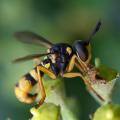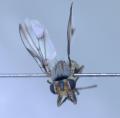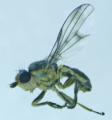Diptera.info :: Identification queries :: Diptera (adults)
Who is here? 1 guest(s)
|
Dolichopididae for ID
|
|
| conopid |
Posted on 26-06-2006 21:42
|
|
Member Location: United Kingdom Posts: 1039 Joined: 02.07.04 |
Wow, this thing is beautiful. To save me time IDing it, can anyone suggest genus or species?
conopid attached the following image: 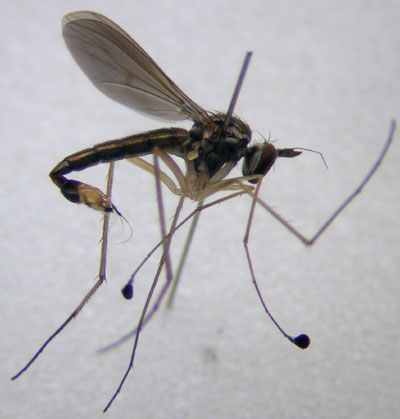 [24.68Kb] Nigel Jones, Shrewsbury, United Kingdom |
|
|
|
| paqui |
Posted on 26-06-2006 21:50
|
|
Member Location: Valencia (spain) Posts: 816 Joined: 02.09.05 |
wow! maybe Medeterinae (curved vein M)? |
|
|
|
| Kahis |
Posted on 26-06-2006 22:09
|
|
Member Location: Helsinki, Finland Posts: 1999 Joined: 02.09.04 |
Hypophyllus discipes. First time I've seen it, we don't have it here in Finland. Nice!
Kahis |
| conopid |
Posted on 26-06-2006 22:10
|
|
Member Location: United Kingdom Posts: 1039 Joined: 02.07.04 |
Wow, Instant answer! Many thanks.
Nigel Jones, Shrewsbury, United Kingdom |
|
|
|
| Nikita Vikhrev |
Posted on 26-06-2006 22:10
|
|
Member Location: Moscow, Russia Posts: 9336 Joined: 24.05.05 |
Hi Nigel. I think it is male Neurigona. In my key (Diptera of European Russia) there is Neurigona longipes (Beck), male with 5-th segment of foretarsus with black plumage, but I can't fintd yet this species in modern checklists. Nikita Nikita Vikhrev - Zool Museum of Moscow University |
|
|
|
| Nikita Vikhrev |
Posted on 26-06-2006 22:19
|
|
Member Location: Moscow, Russia Posts: 9336 Joined: 24.05.05 |
Just found Kahis's reply. As usualy, to be faster than Kahis is impossible (yet). Much more difficult to give as correct ID as Kahis But I still hope someday... Nikita Vikhrev - Zool Museum of Moscow University |
|
|
|
| Kahis |
Posted on 26-06-2006 23:11
|
|
Member Location: Helsinki, Finland Posts: 1999 Joined: 02.09.04 |
For the record, no (European) Medeterinae has such long 'Ministry of Silly Walks' legs, they are rather compact critters. In the field male Hypophyllus are recognisable as 'anorectic Hercostomus', ie. Hercostomus-sized but very slender.
Edited by Kahis on 26-06-2006 23:12 Kahis |
| conopid |
Posted on 26-06-2006 23:34
|
|
Member Location: United Kingdom Posts: 1039 Joined: 02.07.04 |
Hi Kahis and Nikita, Just to let you know that Hypophyllus discipes is scarce in the UK, so I am well pleased with this find. Those flat, balck fore tarsi are unmistakeable I assume? Anyway, it's alovely fly and I have lots more Dolis awaiting ID, so no doubt I will post a few more for advice. Thanks to both. By the way, the UK checklist on the Dipterists Forum web pages calls this fly Sybistroma discipes. Do you know which is the current accepted name? Nigel Jones, Shrewsbury, United Kingdom |
|
|
|
| Xespok |
Posted on 27-06-2006 08:53
|
|
Member Location: Debrecen, Hungary Posts: 5550 Joined: 02.03.05 |
A similar Dolichopodid fly was very common in Hungary a month ago for a week or so. Is this the same genus? What is the role of the enlarged black tarsi?
Xespok attached the following image: 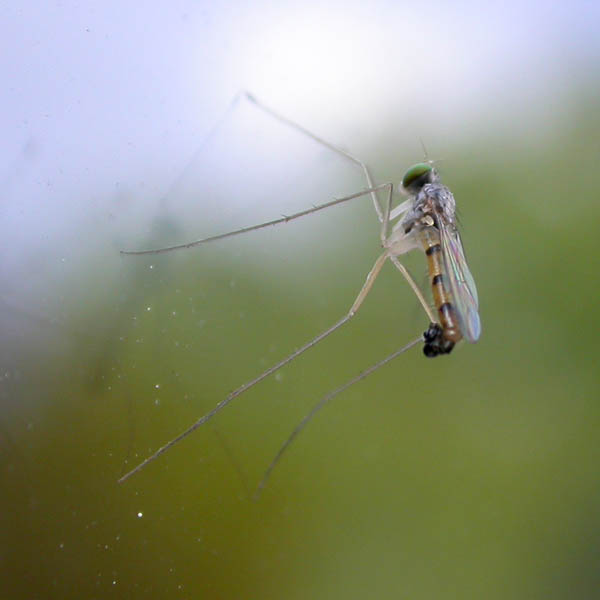 [48.07Kb] |
| Paul Beuk |
Posted on 27-06-2006 09:05
|
|
Super Administrator Location: Netherlands Posts: 19365 Joined: 11.05.04 |
Without a clear view of the fore tarsus I cannot be entirely sure, but following Grichanov's key (see HERE) I arrive at Neurigona abdominalis, a male.
Paul - - - - Paul Beuk on https://diptera.info |
| Xespok |
Posted on 27-06-2006 10:43
|
|
Member Location: Debrecen, Hungary Posts: 5550 Joined: 02.03.05 |
Unfortunately the legs are very long in this species, so it is difficult to get everything in the same focal plane. I have another image where the tarsi are slightly better visible. The modified tarsi were very obvious in these flies. |
| Xespok |
Posted on 27-06-2006 10:48
|
|
Member Location: Debrecen, Hungary Posts: 5550 Joined: 02.03.05 |
Following yout link, I visited the Dolichopodidae phototheque, where an image of Neurigona quadrifasciata male looks very similar to my image. I suspect this image must show the female of the same species than. |
| Paul Beuk |
Posted on 27-06-2006 10:48
|
|
Super Administrator Location: Netherlands Posts: 19365 Joined: 11.05.04 |
Ha, then it is Neurigona quadrifasciata after all.
Paul - - - - Paul Beuk on https://diptera.info |
| Jump to Forum: |



